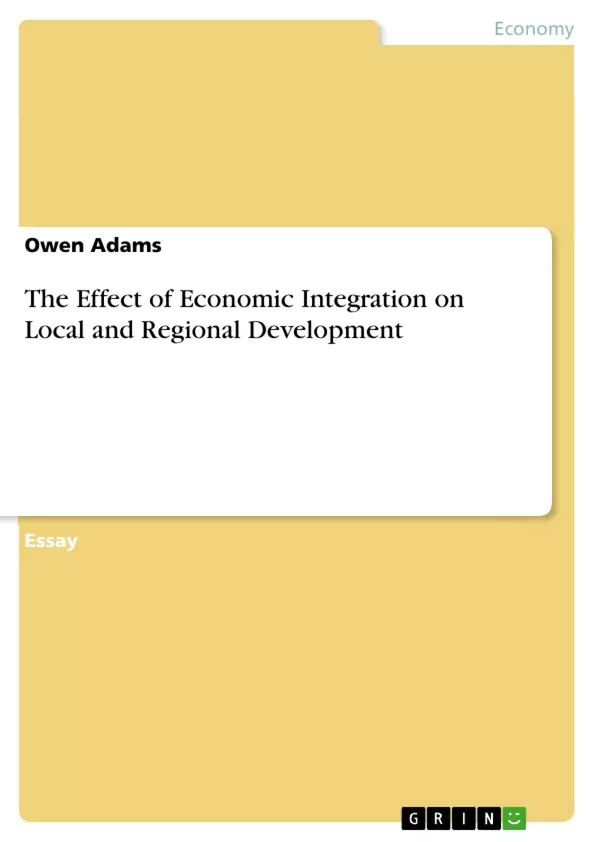This paper examines the effect of economic integration on local and regional development in Africa. It explores the potential benefits, challenges, and opportunities that come with economic integration among African countries.
The study acknowledges the importance of economic integration in accelerating growth and development on the continent, and highlights the need for effective national economic frameworks and policies to support regional integration efforts. Economic integration is seen as a blueprint for African countries to reap the benefits of globalization and integration into the global economy.
The paper reviews the concept of economic integration, the stages of integration, and the benefits it brings, such as expanded markets, increased efficiency, and economies of scale. However, it also acknowledges the challenges facing economic integration in Africa, including poor governance, low political commitment, and weak institutional frameworks.
The paper analyzes the progress of the East African Community (EAC) as an example of regional economic integration and highlights the positive impacts it has had on market access, trade negotiation capacity, transport and communication infrastructure, and the free movement of people and goods.
The study concludes that economic integration has the potential to transform the African economic landscape, but the challenges need to be addressed, including addressing corruption, strengthening institutional frameworks, and harmonizing policies.
The paper recommends the ratification of the African Continental Free Trade Area (AfCFTA) as a means to accelerate greater integration among African nations and remove barriers to trade and development.
Table of Contents
- Abstract
- Introduction
- Problem statement
- Objectives
- Literature review
- What is Meant by Economic Integration?
- Stages of Economic Integration
- Benefits of Economic Integration
- Challenges of Regional Economic Integration in Africa
- The EAC as an example of regional Economic Integration
- Conclusions and recommendations
Objectives and Key Themes
This paper analyzes the impact of economic integration on local and regional development in Africa. It examines the potential benefits, challenges, and opportunities associated with economic integration among African countries, highlighting its significance in accelerating growth and development on the continent. The paper emphasizes the importance of effective national economic frameworks and policies to support regional integration efforts.
- Economic integration as a catalyst for growth and development in Africa
- Benefits and challenges of economic integration in Africa
- Role of national policies in supporting regional integration
- Impact of regional integration on market access, trade negotiation capacity, and infrastructure development
- Analysis of the East African Community (EAC) as an example of regional economic integration
Chapter Summaries
- Abstract: This paper examines the impact of economic integration on local and regional development in Africa, highlighting its benefits, challenges, and opportunities. It emphasizes the importance of effective national economic frameworks and policies to support regional integration efforts.
- Introduction: The paper introduces the concept of regional economic integration in Africa, emphasizing its potential to accelerate growth and development. It acknowledges the challenges facing the continent, including poverty, unemployment, and underdeveloped infrastructure, and highlights the need for economic integration to address these issues.
- Problem statement: The paper proposes that regional economic integration is crucial for African member states to enhance and speed up the continent's economic growth and development. It emphasizes the need to explore the benefits, challenges, and opportunities associated with economic integration and analyze the progress of the East African Community (EAC) as a case study.
- Objectives: The paper aims to define regional economic integration, examine its benefits, identify challenges facing economic integration in Africa, and analyze the progress of the EAC.
- Literature review: This section provides a comprehensive overview of the concept of economic integration, exploring its various definitions and stages. It also examines the benefits of economic integration, such as expanded markets, increased efficiency, and economies of scale. The section acknowledges the challenges of regional economic integration in Africa, including poor governance, low political commitment, and weak institutional frameworks. Finally, it analyzes the progress of the East African Community (EAC) as an example of regional economic integration, highlighting its positive impacts on market access, trade negotiation capacity, transport and communication infrastructure, and the free movement of people and goods.
Keywords
The main keywords and focus topics of this paper include economic integration, regional development, African economies, benefits of integration, challenges of integration, East African Community (EAC), national economic frameworks, and policies. It emphasizes the importance of understanding the concept of economic integration, its potential to stimulate growth and development in Africa, and the challenges that must be overcome to achieve successful integration.
Frequently Asked Questions
How does economic integration benefit African countries?
Economic integration provides benefits such as expanded markets, increased efficiency, economies of scale, and improved trade negotiation capacity.
What are the main challenges facing regional integration in Africa?
Major challenges include poor governance, low political commitment, weak institutional frameworks, and corruption.
What is the role of the East African Community (EAC) in this study?
The EAC is used as a case study to demonstrate positive impacts of integration on market access, infrastructure development, and the free movement of people and goods.
What is the AfCFTA?
The African Continental Free Trade Area (AfCFTA) is a proposed agreement to accelerate integration among African nations and remove barriers to trade and development across the continent.
Why are national economic frameworks important for regional integration?
Effective national policies are necessary to support regional efforts and ensure that countries can reap the full benefits of globalization and larger regional markets.
- Quote paper
- Owen Adams (Author), 2023, The Effect of Economic Integration on Local and Regional Development, Munich, GRIN Verlag, https://www.grin.com/document/1365651



